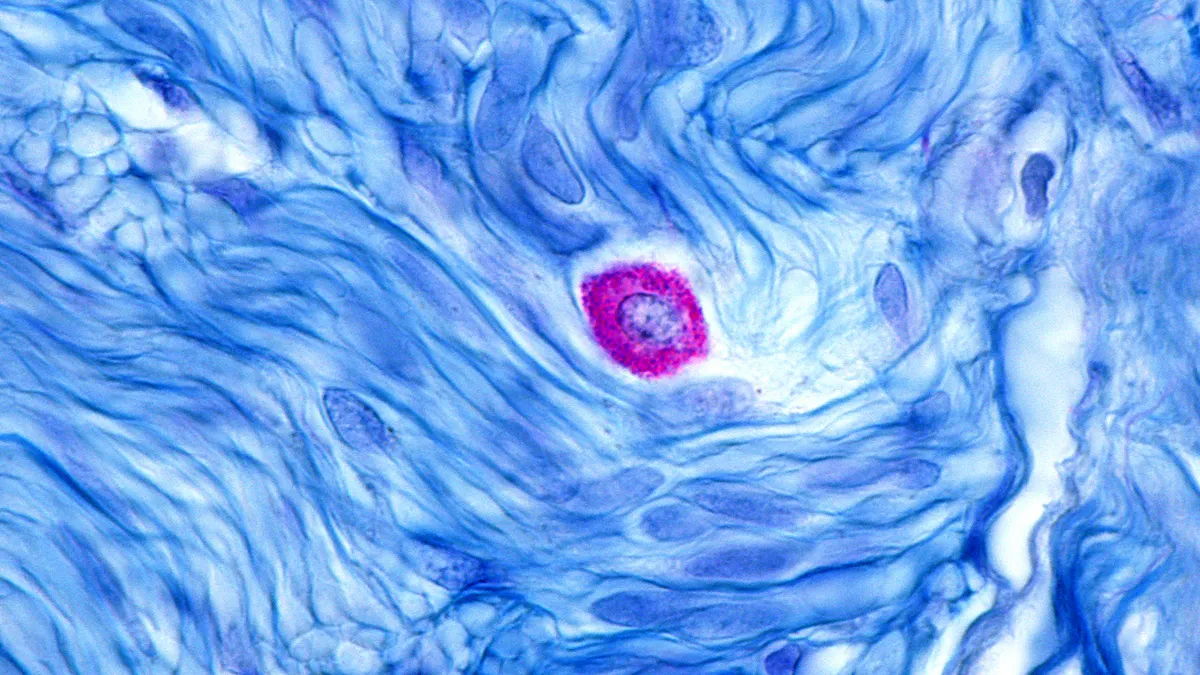Cogent Biosciences on Monday said its drug bezuclastinib succeeded in a mid-stage study designed to assess whether it reduced symptoms of an uncommon immune cell disorder.
The disorder, systemic mastocytosis, involves a type of white blood cell called mast cells, which ordinarily play a key role in the body’s immune defense. In people with the condition, mast cells accumulate in various tissues, releasing inflammatory substances that in turn cause a constellation of allergy-like symptoms.
Estimates vary, but tens of thousands of people in the U.S. are thought to have systemic mastocytosis, most typically a non-advanced form.
In its Phase 2 “Summit” study, Cogent tested its drug versus placebo in around 180 people with this disease type, measuring symptoms such as fatigue, pain, skin irritation and nausea on diary-based scoring system. Among participants given bezuclastinib, the average score reduction was just over 24 points after six months, versus an average of 15.4 points for those in the placebo group.
Cogent also measured levels of serum tryptase, a protein that’s secreted by mast cells. According to the company, 87.4% of people who received bezuclastinib had a 50% or greater reduction in serum tryptase levels, compared to none of those on placebo.
“We have been eagerly awaiting this day,” said Andrew Robbins, Cogent’s president and CEO, in a company statement. “Our team is already at work on our first new drug application for bezuclastinib that we expect to file with the [Food and Drug Administration] later this year.”
The most common side effects associated with bezuclastinib treatment were changes in hair color, altered sense of taste, nausea and elevated levels of an enzyme that, if sustained, can indicate liver damage. Cogent said all cases of elevated liver enzymes resolved and noted there were no other liver-related side effects.
Bezuclastinib is a potential competitor to Blueprint Medicines’ Ayvakit, which was first approved in 2020 as a gastrointestinal cancer treatment and won expanded OKs in 2021 and 2023 for the advanced and non-advanced forms of systemic mastocytosis. Ayvakit is the main draw in Sanofi’s $9.5 billion deal to acquire Blueprint, which the companies announced last month.
Both Ayvakit and bezuclastinib target certain mutations in a gene called KIT, which leads to the rapid growth and build-up of mast cells. While Ayvakit is approved, some in the industry were initially skeptical of the drug’s commercial potential, given the effect size observed in testing. Doctors treating systemic mastocytosis patients with Ayvakit have needed to increase its dosage to achieve better efficacy, according to a recent survey by the investment firm Jefferies.
Cogent’s drug, if approved, could become another option for patients with the more common non-advanced systemic mastocytosis. Analysts note that, as bezuclastinib appears more selective than Ayvakit, it also holds potential as treatment for advanced patients, too.
Kelly Shi, a Jefferies analyst who has a “Buy” rating on Cogent stock, described Monday's data as a “home run scenario” for the company, and noted that its trial enrolled more severe patients compared to Blueprint's tests of Ayvakit.
”While the efficacy on a placebo-adjusted rate was in line with our expectations, safety was better than anticipated,” Leerink Partners analyst Andrew Berens wrote in a separate note to clients.
Cogent is running studies of bezuclastinib in patients with advanced systemic mastocytosis, as well as in people with gastrointestinal tumors. Results from both are expected later this year. It’s also planning an expanded access program for people with either form of systemic mastocytosis who have not responded to at least one approved therapy.
Cogent shares climbed by as much as 30% Monday morning on news of the data.













